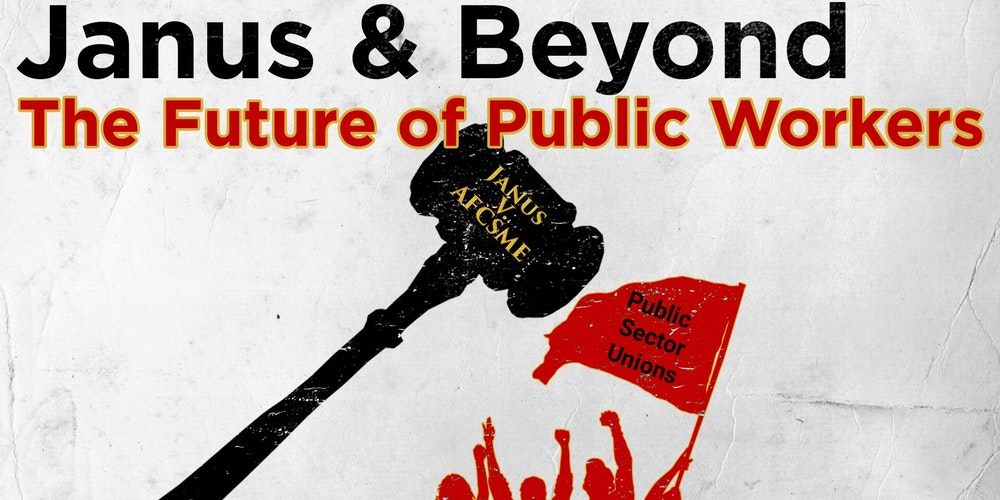
Janus vs. Fair Share Fees
The organizations financing the attack on unions’ ability to represent workers
Written By EPI
Over the last decade, a number of cases attacking the rights of public-sector union members have been quietly working their way through the courts and, finally, up to the U.S. Supreme Court.
The most recent of these challenges is Janus v. AFSCME Council 31, which the U.S. Supreme Court will hear on February 26. If the court rules for Janus, it will likely have the most significant impact on workers’ freedom to organize and bargain collectively in 70 years.
Janus is the third case to come before the Supreme Court in five years involving public-sector unions’ ability to collect “fair share” (or “agency”) fees. As this report will show, Janus, and the two fair share cases that preceded it, did not grow from an organic, grassroots challenge to union representation. Rather, the fair share cases are being financed by a small group of foundations with ties to the largest and most powerful corporate lobbies. These organizations and the policymakers they support have succeeded in advancing a policy agenda that weakens the bargaining power of workers. In Janus, these interests have focused their attack on public-sector workers—the workforce with the highest union density.
We examine the core group of organizations financing this litigation. By tracing the origins of these legal challenges, and explaining how the challenges target unions, we show that challenging fair share fees in the courts appears to be part of a broader billionaire-financed agenda to weaken unions and shift power away from ordinary workers.
How fair share fees prevent “free riding”
A union is required to represent a nonmember worker who is mistreated by the employer as the nonmember pursues a costly grievance process, even if it costs the union tens of thousands of dollars. Fair share fees enable the union to charge nonmember workers for the right to access that service if they need it. Without the ability to collect fair share fees, the nonmember worker could access these expensive representation services without having paid a dime.
Workers who choose not to pay union dues also receive the higher wages and benefits that the union negotiates on behalf of its members. Eliminating fair share fees encourages “free riding”: workers paying union dues see coworkers who are paying nothing but getting the same benefits, and they decide to leave the union and stop paying union dues. Public-sector unions have worked for decades to protect the rights of the teachers, nurses, firefighters, police officers, and other public servants that communities depend on. Taking away unions’ ability to collect fair share fees—while they are nonetheless required to provide services and representation to nonmembers—would threaten the very existence of unions by weakening their financial stability.
The possibility that workers could decide not to pay for the union benefits they receive if fair share fees are outlawed does not mean that they do not value these benefits. This proposition was explained in an amici curiae brief to assist the Supreme Court in understanding the free-rider problem at issue in Janus v. AFSCME, which was signed by 36 distinguished economists and professors of economics and law, including three Nobel laureates. The scholars explained that the free-rider problem is a well-established concept in economics. In particular, the brief shows it is widely accepted that if an individual chooses not to pay for a resource provided to him or her for free, it does not mean the individual does not value the resource, and that when individuals who benefit from a resource do not pay for it, the resource will be underprovided.
For example, as the brief points out, a recent union recertification election in Iowa revealed that a majority of workers in the bargaining unit voted in favor of continuing to be represented by the union, even though most of them also opted out of paying fair share fees. A recent change in Iowa state law requires public-sector unions to hold a vote and be recertified before each new contract negotiation, and recertification requires not just a majority of those voting but a majority of all workers covered by the collective-bargaining agreement—union members and nonmembers alike. Since Iowa state law already prohibits fair share fees in public-sector unions, the nonmembers are not required to pay fair share fees, even though they are covered by and benefit from the union’s contract.
In October 2017, the election results for AFSCME Iowa Council 61 revealed that 83 percent of all employees covered by the union’s collective-bargaining agreements voted in favor of recertifying the union.5 Only 15 percent of the workers failed to vote, and only 2 percent voted against the union. Yet a mere 29 percent of workers who are union members pay all of the costs of the union’s collective bargaining—despite the fact that the vast majority of employees agree they benefit from, and affirmatively voted for the union. The remaining 71 percent of the workers in the bargaining unit are free riders, in that they are covered by the union contract but are nonmembers and do not pay any fair share fees because Iowa’s law prohibiting fair share fees allows people to obtain the benefits without paying for them.
Click here to read the full report
